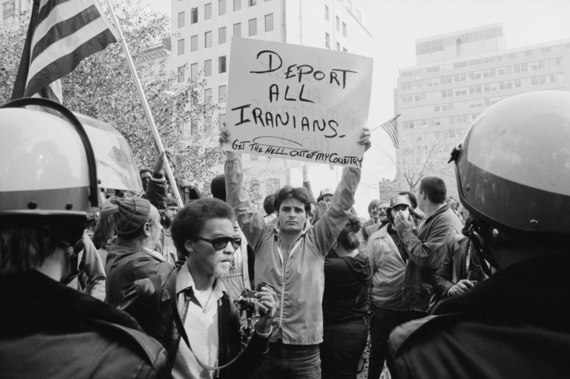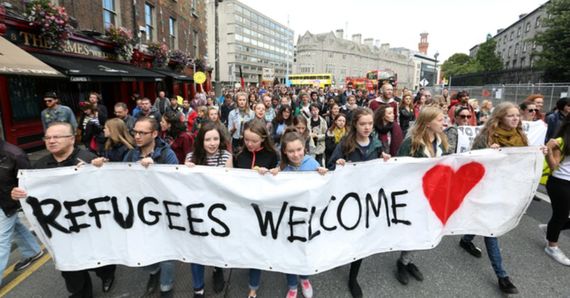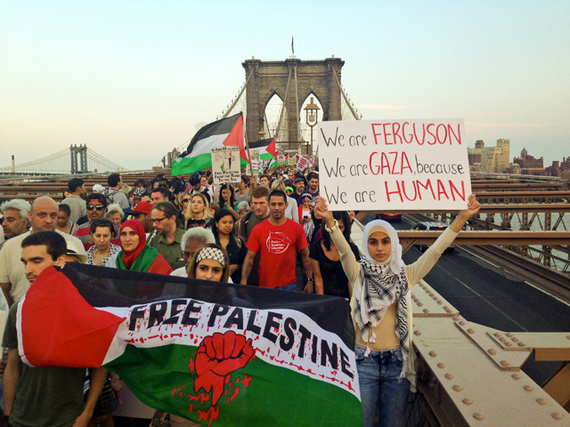The last few weeks have seen a dangerous escalation of rhetoric targeting Muslims and Middle Eastern-Americans, as the national media and Republican presidential hopeful Donald Trump have fed off each other's vitriolic and incendiary rhetoric to produce a perfect storm of hate and incitement. Already, before the backlash following the San Bernardino massacre began, rates of discrimination facing Muslims or those perceived to have Muslim heritage were at rates far above and beyond those following the September 11 attacks.
50% of Muslim children in California schools, for example, reported being bullied as a result of their faith, while physical and verbal attacks by passerby on Muslim women wearing hijab have become a daily occurrence across the country. More insidiously, openly anti-Muslim speech had become increasingly normative, with calls for deportation and the destruction of "Islam" as a whole entering into the mainstream in a way they had rarely been voiced previously. Now, it is not only right-wing wingnuts calling Islam a murderous cult; it is neighbors and co-workers, increasingly voicing sentiments once confined to white supremacist chatrooms.
This is not to say that violence against Muslims, Middle Eastern Americans, or those in any ways perceived to be related to Islam (including mistakenly, such as Sikhs) is something new. While some commentators lamented the days when George W. Bush vocally called Islam a "religion of peace" and denounced those who associated it with terrorism, the same president of course was responsible for invading Afghanistan and Iraq and leading drone wars across the region, leaving millions dead and producing exactly the firestorm that led to where we are today. It should not be forgotten that it was the right-wing, neoconservative, "with-us-or-against-us" and "clash of civilizations" rhetoric that Bush and his cohort loudly espoused that produced the same discursive space groups like ISIS today claim to inhabit, albeit from the opposite side of the divide (they are avowedly "against us," obviously, whoever "us" may be).
But something has perceptible changed. We are on the verge of a precipice, and in a perfect example of how hate speech fuels actual hate-filled violence and vice-versa, demagogues like Donald Trump have managed to successfully push the limits of acceptable speech and make questions like "Should all Muslims be banned from America?" a normal part of water cooler chatter.
No doubt emboldened by the words of Donald Trump, earlier this week the US House of Representatives passed Bill 158 with 90% support, and it is now set for a Senate vote that could bring it closer to becoming law. Under the guise of protecting national security, the bill would dramatically change the conditions under which foreign nationals can enter the United States. As of now, 38 countries -- including most of Europe, as well as Australia, New Zealand, and Japan -- can enter the United States without applying for a visa, as part of an agreement that ensures US citizens can enter those countries visa-free as well. HR 158 would exempt citizens of these countries who have traveled to Iraq, Syria, Iran, or Sudan, as well as those who hold dual nationality regardless of their ties to said countries, from the program.
Because the current visa-free travel regime is based on the principle of reciprocity (i.e. Europe allows visa-free travel because the US allows visa-free travel), such a move -- which means the US would recognize two classes of European citizens with different travel rights and privileges -- would thereby push the affected countries to do the same vis-a-vis US citizens. In effect, the bill would create a second class of US citizens as well, encompassing Iranian-Americans, Iraqi-Americans, Syrian-Americans, and Sudanese-Americans, or any person with sole US citizenship but who had visited any of those countries in the past 5 years.
The law passed the House of Representatives and is now headed to the Senate, after which President Obama will have to vote on it. On one hand, it is hard to imagine such a bill becoming law; on the other hand, in the current climate, it is hard to imagine a critical mass opposing it.
Some have wondered how the US could possibly regulate dual citizens or even identify those with dual citizenship. But the fact is, the United States has enforced strict sanctions on all of these countries for the last few decades, and dual citizens -- as the category most likely to potentially violate the sanctions, as well as the easiest for the US to track -- have been registered informally or formally as such by the United States government for decades.

Protest targeting Iranian-Americans in 1979, in the wake of the hostage crisis. (Marian Trikosko/Library of Congress)
As an Iranian-American, under US law it is illegal for me to engage in many activities in Iran, including something as basic as transferring money to my grandmother who lives in Iran. When I return to the United States, I am asked explicitly at passport control if I am a dual citizen of Iran. The United States has been tracking people like us for decades, and if anything this new law will spur a new surveillance apparatus to formalize this control.
Iranian-Americans are not alone. Syrian-Americans, Iraqi-Americans, and Sudanese-Americans are targeted by this legislation just as much as we are. All four of these nationalities have witnessed decades of hardship and emigration in their homelands, none more than Syrians and Iraqis. The law is collective punishment, pure and simple, and it targets those most vulnerable and already most beleaguered as a result of decades of US policies towards these countries.
Although the legislation is technically focused on travel, by creating two-tier citizenship it creates a precedent for wide-ranging action, explicitly legitimizing a discriminatory system that could massively erode civil rights on a much wider scale, for a much broader range of people in this country. If HR 158 passes, the consequences for millions of Americans -- especially other Middle Eastern or predominantly Muslim communities, but for people of color and those of immigrant origin in general -- are grave. If it passes, this bill will be just the beginning.
It is thus with a great deal of surprise that I noticed how some in the Iranian-American community have reacted. In The Guardian, an opinion piece appeared denouncing the fact that Iranians were being "scapegoated," calling for Pakistanis and Saudis to be "collectively punished" but Iranians to be spared because they have nothing to do with terrorism. This horrifying piece was spread widely among Iranian-Americans, who seemed to hope that somehow Iranians should be exempt from the storm of Islamophobia engulfing the country. Strangely, the author seemed to be completely ignorant of the fact that the law does not "scapegoat" Iranian-Americans; it is actually focused on Iraq and Syria, but includes Iran and Sudan as well because they are on the official US list of state sponsors of terrorism.
To call for "collective punishment," just not "against us," is fascism, pure and simple. It is also a terribly narrow view of the world, and one in which it seems some Iranians have learned nothing from the last few decades. Collective punishment is wrong no matter who it is against, and should not be meted out against the US government against any nationality. The basis of liberal democracy is that the masses cannot be punished for the evils of a few. Just as all Americans not all be condemned to the gallows for the mass murder committed under George W. Bush or all French citizens condemned for the sins of colonialism, so should all Muslims or citizens of the countries listed above no matter what religion they may be not be attacked for the actions of a few.
(Sam Boal/The Journal)
Other Iranian-American organizations unfortunately fed into this rhetoric of Iranian exclusivity as well. The Public Affairs Alliance of Iranian-Americans, for example, denounced the law by stressing that Iranian-Americans contribute to the country's "economic strength" and "serve as government officials, in the military and law enforcement" -- as if the wealth of Iranian-Americans or their commitment to supporting the world's largest military responsible for the deaths of millions that got us into this mess were a point of pride. Even the National Iranian American Council responded by stressing how "pro-American" Iranians in general are, bizarrely thrown in the middle of an otherwise powerful statement stressing solidarity against racism. Another call to action released by NIAC, meanwhile, calls for Iranian-Americans to contact their legislators to oppose the bill's discrimination against Iranian-Americans, instead of telling them to oppose the bill wholesale. Should Iraqi-Americans who do not support the military and government that invaded their country and left it a devastating mess be punished for not being patriotic enough? Should immigrant communities that are not economically successful be disposable in the eyes of the law? By reinforcing the Iranian "model minority" myth, these statements take us down an extremely dangerous road.
The current moment demands solidarity from Iranian-Americans with all other citizens of the affected countries as well as Middle-Eastern-Americans and those of Muslim heritage more broadly. We are in a moment of crisis, a moment in which the drumbeat of war, incitement, and terror is louder than it has ever been and where we are being driven out of our homes, offices, and schools.
(Jed Brandt/Democracy Now)
I grew up in the years following 9/11, yelled at by classmates for being "Osama Bin Laden" and "Saddam Hussein" and a hundred other slurs that made no distinction between Iranian, Iraqi, Afghan, Saudi, or anyone else. Collective punishment, bullying, and hate speech target us all and affect us all. The answer is not to demand an Iranian-American exemption. How long will we hope that our best bet is to bury our heads in the sand and hope that everyone else gets rounded up but we "get spared"?
The answer to this bill is not to scapegoat and attack others the way we have been scapegoated and discriminated against. It is to stand in solidarity the way we hope that ours will stand in solidarity with us. Today, Iranian-Americans, Syrian-Americans, Iraqi-Americans, and Sudanese-Americans are being targeted by wildly discriminatory legislation that would remove their rights as US citizens and open the doors to further discrimination against other Muslim or Middle Eastern-Americans. We must oppose this legislation, and we must use this as an opportunity to reflect on our experiences with discrimination in this country and how they are embedded in a wider system of discrimination that affects all people of color in this country.
Islamophobic hatred does not exist in a vacuum; it is produced by the same settler-colonial system that carried out a genocide against Native Americans, forced millions of Africans into slavery for economic profit, and continues to discriminate against people of color, most harshly African-Americans, across the nation even today. These attempts to discriminate against us emerge from that history. For years we have tried desperately to sink into "honorary whiteness," to pretend that as Middle Eastern Americans we did not share the lot of anti-Native, anti-Black, anti-Latino, or anti-Asian discrimination that has characterized the experiences of countless millions of people in this land since its foundation.
Today, let us not repeat the mistakes of the past. Let us not retreat into honorary whiteness and blame those around us while deluding ourselves as to the nature of this discriminatory system. Let us not abandon our brothers and sisters facing this Islamophobic wave of hatred at levels far worse than our own - like Black Muslims in this country, or Muslims of African heritage from the Arab World and elsewhere - and let us realize that we can only be free if all others are as well.
Iranian-Americans are by no means being exclusively "scapegoated," and to argue as such is to bury one's head in the sand and see only one's pain. This is the opposite of solidarity, and it is the opposite of what is required of us today. In the words of the 13th century Persian poet Saadi:
بنی آدم اعضای یک پیکرند
که در آفرینش ز یک گوهرند
چو عضوی به درد آورد روزگار
دگر عضوها را نماند قرار
تو کز محنت دیگران بی غمی
نشاید که نامت نهند آدمی
Human beings are members of a whole,
In creation of one essence and soul.
If one member is afflicted with pain,
Other members uneasy will remain.
If you've no sympathy for human pain,
The name of human you cannot retain!


